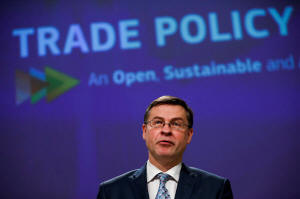|
After five years of negotiations, coordinators Australia, Japan
and Singapore distributed what they called a "stabilized text",
which the European Union hailed as "historic news" and Britain
as "groundbreaking".
"We negotiated the first global rules on digital trade," EU
trade chief Valdis Dombrovskis posted on social media site X.
Britain said the agreement would commit all participants to
making customs documents and processes digital, recognizing
e-documents and e-signatures, and put in place legal safeguards
against online fraudsters and misleading claims about products.
The text says the parties will seek to limit spam and protect
personal data, as well as offer support to least-developed
countries.
Ninety-one of the World Trade Organization's 166 members have
engaged in the negotiations, including China, Canada, Argentina,
Nigeria and Saudi Arabia.
The United States said that the new text was an important step
forward, but that it still fell short and more work was needed,
including on wording about exceptions due to essential security
interests.
"We look forward to working with interested members in finding
solutions to all remaining issues and moving the negotiation to
a timely conclusion," U.S. WTO ambassador Maria Pagan said in a
statement.
Certain other countries, such as Brazil, Indonesia and Turkey
also had reservations, according to a Geneva-based trade source,
adding that in most cases these were on minor points.
Participants may still struggle to make their accord a formal
WTO agreement because that would require consensus among all WTO
countries. India and South Africa have been particularly
critical on deals that do not involve all members.
(Reporting by Emma Farge and Philip Blenkinsop; Editing by
Tomasz Janowski)
[© 2024 Thomson Reuters. All rights
reserved.]
This material may not be published,
broadcast, rewritten or redistributed.
Thompson Reuters is solely responsible for this content.

|
|




